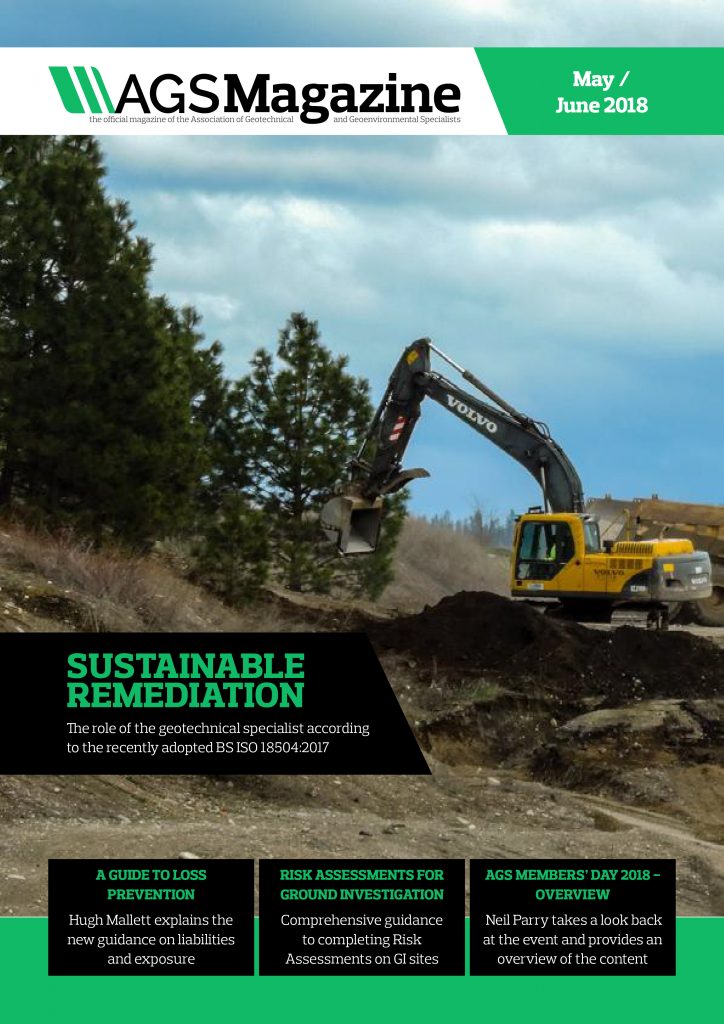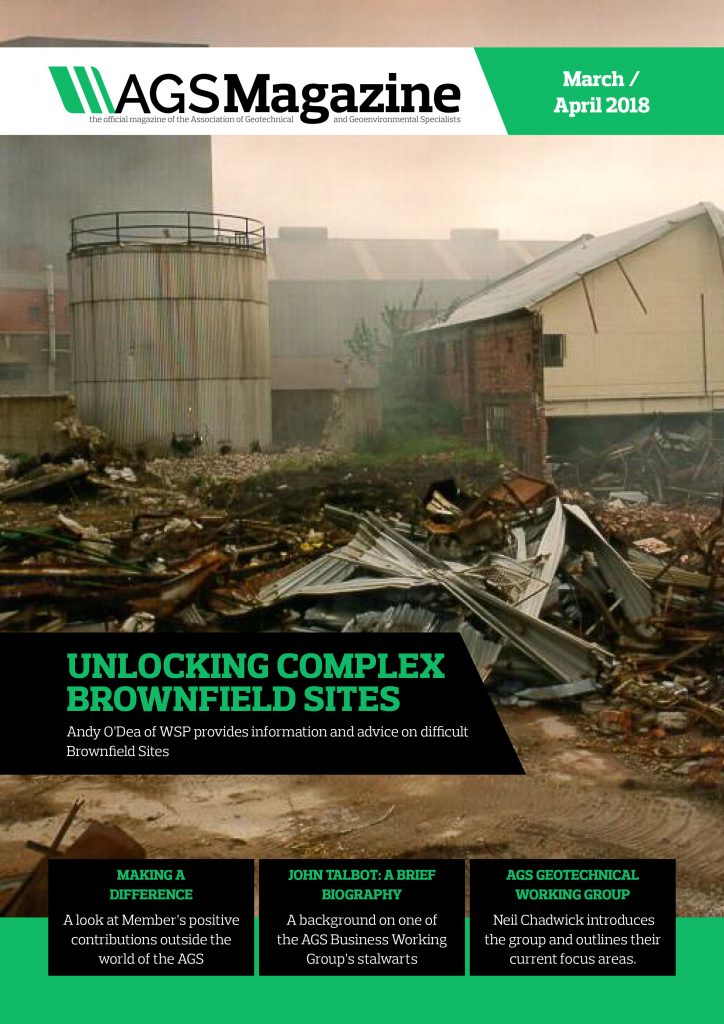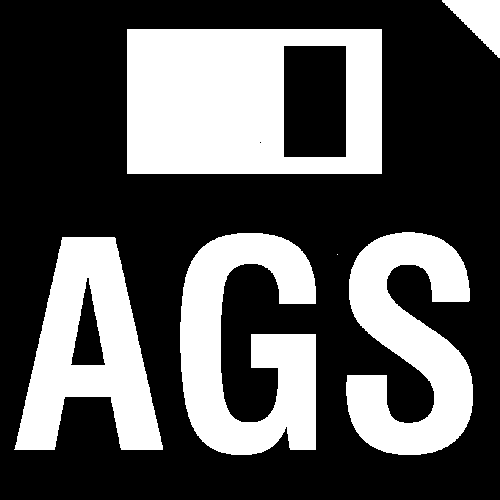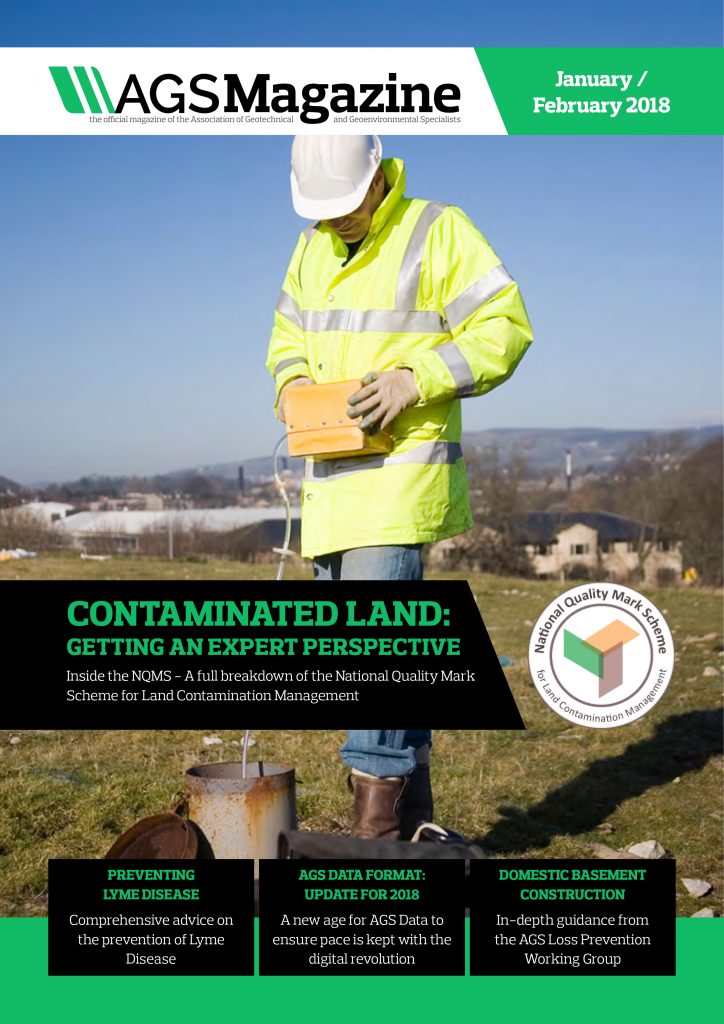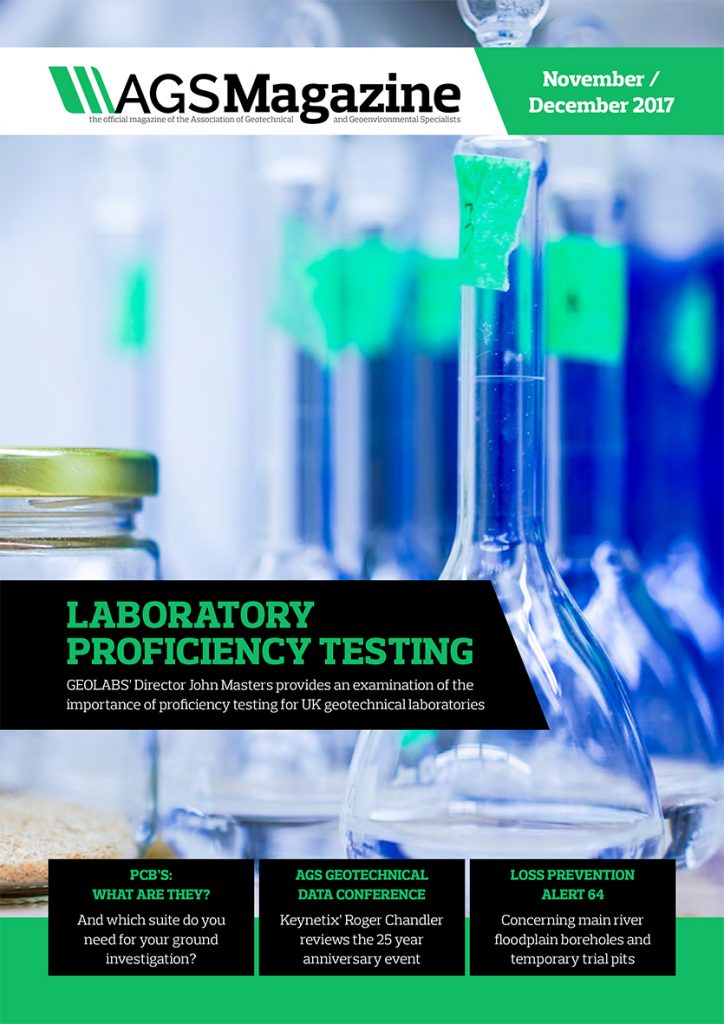The Association of Geotechnical & Geoenvironmental Specialists are pleased to announce that their upcoming ground risk conference will take place on Wednesday 12th September 2018 at the Cavendish Conference Centre in London.
Ground Risk: why take the chance? A lessons learnt conference is a full day, CPD event organised by the Association of Geotechnical and Geoenvironmental Specialists, which will provide a focus on how ground risk can be identified, quantified, and measured for the whole project team using cutting edge technology allied with professional experience. It’ll also look at specific areas where we can improve the quality of contaminated land assessment and the risk associated with getting it wrong.
Ground Risk: Why Take the Chance? is aimed at attendees involved in construction projects from concept and planning through to implementation and not solely for geotechnical engineering specialists to help drive a change in the way ground risk is considered in the UK and beyond.
Speakers for the event include Stephen Tromans, who is recognised as one of the leading practitioners in Environmental Law in the UK, award-winning geologist, Jacqueline Skipper, Dr Andrew Smith, Coffey and Brownfield Briefing and GE Award winners, Arcadis.
Speakers and synopsis for the event include:
Ground Risk – Where do I start?
Dr Jacqueline Skipper, Senior Partner and Senior Geologist at the Geotechnical Consulting Group
Ground risk is often considered in terms of properties or features of the ground that create risks for construction, and this is of course a fascinating subject – but is that really all we have to consider? In construction projects, ground risk also concerns knowledge, communication and contracts. In this presentation I’ll be exploring these areas of the subject and looking at how we can interact, positively or negatively.
Managing Risk for a Deep Basement Excavation
Dr Andrew Smith, Technical Director at Coffey Geotechnics
The ICD Brookfield development will comprise a 290m tall tower with a 7-level basement (the deepest basement in Dubai). A 5-level basement was previously constructed on the site along with all the foundation piles. The basement was later backfilled when construction ceased in 2009.
The risks on this project were predominantly associated with the previous construction. Particular challenges included the deepening of the basement, the construction of new deeper temporary retaining walls, pile re-use and construction in close proximity to adjacent structures. In addition, this is the first construction in Dubai where removable anchors have been used.
The presentation describes how the risks were assessed and how a basement construction strategy was developed to manage them.
The Application of Advanced Continuous Surface Wave Data to Managing Ground Risk
Chris Milne, Director at Ground Stiffness Surveys
Advanced Continuous Surface Wave (ACSW) testing has been developed as a cost-effective non-intrusive means for obtaining ground profiles for geotechnical engineering. Data provided by ACSW includes accurate ground stiffness profiles at a known strain, shear wave velocity profiles (for seismic design, liquefaction assessment, rock quality assessment and for evaluation of soil properties) and Rayleigh wave velocity data (for high speed rail design). The robust, rapid and low-risk nature of the ACSW technique has resulted in its use across a range of challenging construction conditions including high-risk services environments, active construction sites and time-constrained highways and rail sites. The speed and cost-effectiveness of ACSW has the potential to significantly reduce geotechnical risk by supplementing traditional investigation and testing, as well as providing an alternative means of assessing difficult-to-investigate features such mineshafts, natural cavities and problematic ground. Advances in ACSW technology, recent applications for ground risk reduction and opportunities in this growing field are outlined.
Investigation and Treatment of Chalk Solution Features – Changing Risk Profile with Additional Information
Allan Bell, Regional Director at Hydrock
This talk will present a case study for the investigation and treatment of Chalk Solution Features. It will discuss:
• changes in the risk profile as the project progressed;
• the changing investigation methods and mitigation measures as the project progressed and the risk profile changed; and
• the clients change in approach to risk as their confidence in the data and their understanding of risk increased; and
• agreement of the changes with the NHBC.
The presentation will show changes in the clients acceptance of risk as the amount of data increases and their understanding of risk increase.
Identifying and Minimising Risk through a Value Engineered Geotechnical Solution & Case Study: 36hrs Inside Queen Street Tunnel, Glasgow
Natalie Bews, Senior Engineering Geologist and Eric Downey, Senior Engineering Geologist at Structural Soils
The initial presentation will highlight the risk of undertaking a development (structure/property) without a sufficiently scoped ground investigation. A review by the National Economic Development Office (NEDO) of 8,000 commercial buildings found that over 66% of the projects over run by at least a month. Analysis of these showed that 50% had overrun due to unforeseen ground conditions.
The case study will focus on a railway tunnel in Scotland, where a large amount of ground investigation coring and drilling work was required to be undertaken over a New Year. The ground conditions were unknown but after conducting a trial shift the drilling methodology was chosen to maximise the productivity of the New Year works. This case study identifies how the significant project risks were reduced with the collaboration of the Client in early engagement and allowing of a trial shift prior to the main works.
An Overview of Legal Developments under Part IIA and Contaminated Land
Stephen Tromans, QC, 39 Essex Chambers
An overview of legal developments under Part IIA and contaminated land more generally
Ground Gas Risk – The Risk from Incorrect Characterisation
Gavin Allsopp, Principal Geo-environmental Engineer at NHBC
The presentation will highlight the risks associated with undertaking residential developments without adequate gas risk assessments being completed before construction starts on site. It will present some case studies of sites were the gas regime and required gas protection mitigation measures have not been fully characterised before construction commences, the implications this can have and how these were rectified to ensure safe development.
Waste Classification for Soils – An AGS Practitioners’ Guide
Mike Plimmer, Technical Director at Geotechnical & Environmental Associates
It is apparent that the classification of waste soils (as either hazardous or non-hazardous) is not always completed in accordance with relevant legislation and UK Guidance. This may be because the process is not widely understood, because it is overly complex for the non-chemist, or because it is impractical in contaminated land applications where waste assessment and disposal often occurs over very short timescales. It is still common practice for comparison with landfill waste acceptance criteria to be used (incorrectly) as a substitute for waste classification.
The aim of the AGS Practitioners’ Guide, which will be introduced in this presentation, is to provide a simplified process for the sampling and classification of waste soils on straightforward sites. The Guide will point towards further information and guidance for dealing with these more complex situations. It is not intended that this Guidance duplicates or supersedes the comprehensive guidance on the classification of waste that has been published by the UK Environment Agencies. Rather, it is intended as supplementary guidance, specifically aimed at the classification of waste soil. Users of this Guide are expected to be familiar with the content of Technical Guidance WM3.
Creosote-Tar Seepage Portslade Beach
George Flower, Technical Director GeoScience at Arcadis Consulting
Following winter 2013-14 storms, beach sand was lost and a new outcrop of “crocodile – skin” emerged at lowest spring tides.
From its “scales” wept black ribbons of neat creosote tars.
Obnoxious odours wafted towards Local residents, the water shimmered in a way that it should not; Councillors were concerned, Public Health England informed, Environment Agency engaged.
The former Portslade Gas Works was the key suspect, but this was some 200m distance, and why a problem now, nearly 80 yrs since gas production hey day?
This presentation explains the characterisation process and methods, details some of the techniques employed, and how those were key to development of a detailed CSM, enabling resolution of the unique path the offensive tars were taking.
AGS members may attend the conference for £140 (plus VAT) per person. Non-AGS members will be charged at £210 (plus VAT). A 15% discount will apply to two or more delegates attending from the same company. Please note there is an early bird offer running until 31st July.
To register for the event, please complete the below registration form and return it to ags@ags.org.uk before Tuesday 4th September.
AGS Ground Risk registration form 2018
Two sponsorship packages are available for companies both inside and outside of the AGS. For full information please contact ags@ags.org.uk before Friday 24th August.
EVENT SPONSORS
Ambisense
AmbiSense is a technology company operating in the environmental sector. We build real-time sensor platforms to generate unique insight about a multitude of industrial and environmental problems to help our customers solve complex environmental problems. Our signature product, GasfluX is the world’s first continuous gas and flow monitoring device for ground-gas applications. The technology enables, real-time monitoring of landfills, brownfield sites, onshore O&G facilities and industrial sites
www.ambisense.net/
Envirolab
Envirolab provides laboratory services spanning a broad organic and inorganic portfolio. Our reputation for excellence is built on continually providing our clients with reliable results delivered on time and within budget. Our UKAS and MCERTS accreditations guarantee our commitment to quality. We are the utterly reliable analytical laboratory.
www.envlab.co.uk
Quantum Geotechnical
Quantum Geotechnical, based in South Wales and South West England, working nationwide, provides a comprehensive service across the ground investigation, geotechnical contracting and geotechnical consultancy sectors. We have a specialist fleet of multi-purpose drilling rigs, a UKAS accredited in-house laboratory and a team of experienced and chartered engineers and geologists.
www.quantum-geotech.co.uk
Geotechnical & Environmental Associates
GEA is a well-established and independent geotechnical and geoenvironmental specialist consultant providing a high-quality service to the property and construction industries. Our services include site characterisation, ground investigation and reporting, complex ground movement analyses, with particular expertise in basements, deep foundations and buried infrastructure, contamination assessments and remediation appraisals, foundation analysis and expert advice.
www.gea-ltd.co.uk
Geotechnical Engineering
Geotechnical Engineering Ltd is the UK’s largest privately-owned ground investigation contractor, renowned for providing a range of innovative ground investigation services for thousands of land-based projects since 1961. From Utility Surveying to all aspects of ground investigation and having our own UKAS accredited laboratory, we are proud to call ourselves industry experts.
Home
Soil Engineering
With over 50 years of experience, Soil Engineering are one of the country’s foremost Ground Investigation and Specialist Grouting Contractors. The comprehensive in-house geotechnical laboratory, continually updated plant fleet, and ongoing investment in training and staff development, allow Soil Engineering to provide a reliable and cost-effective solution for any geotechnical project, throughout the UK.
www.soil-engineering.co.uk
Structural Soils
Structural Soils Ltd has evolved into a national, multidisciplinary integrated, geotechnical and geo-environmental Site Investigation Company with the proven capability, capacity and confidence to undertake contracts of any size, in any location and virtually any scope. The company undertakes contracts across the UK through its offices in Bristol, Castleford, Coventry, Glasgow, Hemel Hempstead and Tonbridge.
www.soils.co.uk
In Situ Site Investigation
In Situ Site Investigation is a specialist geotechnical and geo-environmental site investigation company, which specialises in the use of Cone Penetration Testing techniques including seismic, shear vane, video cone, pressuremeter and magnetometer. Our specialised rigs enable us to work in most locations including railways, marine, brownfield sites, river slopes and rugged, mountainous terrain.
http://www.insitusi.com/
Landmark
Landmark’s Envirocheck provides industry-leading site-specific environmental reports that analyse and assess risks for Phase 1 studies. The Envirocheck Analysis digital platform and mobile app was launched to revolutionise site assessments by enabling users to instantly overlay an extensive archive of historical mapping and environmental data, online, to immediately determine associated risks.
http://www.envirocheck.co.uk/
